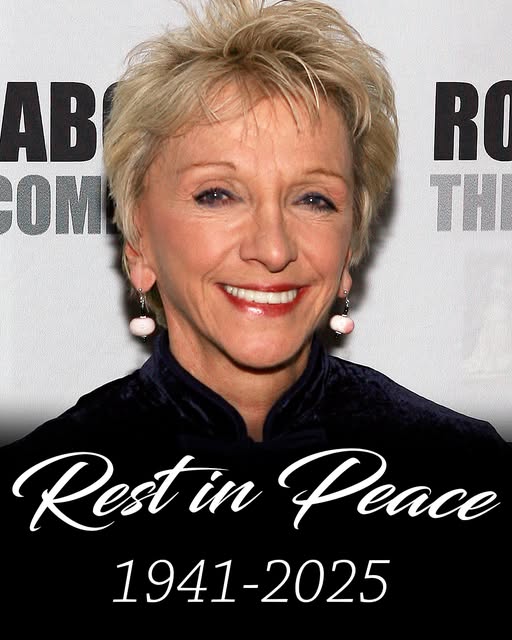A Light on the American Stage: Honoring the Legacy of Elizabeth Franz
When news spread that the acclaimed performer Elizabeth Franz had passed away at the age of 84, the world of theater and entertainment united in a moment of reflection. To many, Franz represented far more than an actress. She symbolized dedication, resilience, and the kind of rare artistic sincerity that can only emerge from a lifetime devoted to storytelling. Her voice, her presence, and her unmatched ability to breathe life into every character made her one of the most revered performers in modern American theater.In an industry where fame can rise and fall in the blink of an eye, Franz built a career rooted not in spectacle but in authenticity. She was a performer who valued emotional truth above applause, craft above celebrity, and dedication above shortcuts. This approach earned her the deep respect of audiences, colleagues, playwrights, directors, and countless younger performers who found inspiration in her work.
Often described by peers as “America’s Judi Dench,” Franz was celebrated for her strength, versatility, and the quiet yet commanding energy she carried into every rehearsal room and performance hall. Over more than five decades, she made her mark on Off-Broadway stages, Broadway productions, television dramas, and feature films. Her influence was woven into every artistic community she touched.Today, as admirers reflect on her remarkable journey, her life story offers not only a window into the evolution of American theater but a deeper understanding of what it means to dedicate oneself fully to a craft.
Chapter 1: Humble Beginnings and the Spark of a Lifelong Passion
Elizabeth Franz’s early interest in performance began long before she discovered professional stages. Like many great artists, her connection to storytelling started in childhood, rooted in curiosity and imagination. Those who knew her as a young girl often recalled her natural inclination to bring stories to life—reading aloud with emotion, imitating characters from books, or performing small scenes for family members. Even in those early years, she possessed a presence that drew people in.Her path into the world of acting was not predetermined. She did not grow up surrounded by industry connections or formal training. Instead, she was a dreamer with a desire to understand human emotion and express it in a way that brought people together. This passion would eventually become the foundation for her life’s work.
As a young performer, Franz joined community plays, local theater groups, and small productions where she embraced every opportunity to learn. She often worked behind the scenes as well—helping to build sets, sew costumes, and assist with props. These experiences gave her a deep appreciation for the collaborative nature of theater and taught her that every role, whether onstage or backstage, contributes to the magic audiences experience.Her earliest mentors recognized something special in her: a seriousness about the craft that exceeded her years, and a determination that hinted at future greatness. She attended workshops, auditions, and acting classes whenever she could, often sacrificing comfort and stability in pursuit of her dream. Despite financial constraints and the unpredictable nature of the profession, Franz remained steadfast. Her belief in the power of performance—and in her own potential—never wavered.
Chapter 2: The Move to New York and a Career-Defining Breakthrough
Like thousands of aspiring actors before her, Elizabeth Franz eventually made her way to New York City, the center of American theater. But unlike many who arrive with big dreams and leave with disappointment, Franz discovered that New York was the place where her talent would finally shine.Her breakthrough came in the Off-Broadway production of “Sister Mary Ignatius Explains It All for You,” a play known for its sharp dialogue, intense themes, and emotionally charged characters. Franz was cast in the demanding role of a stern, intelligent, and deeply committed Catholic nun—a character whose convictions shaped every interaction she had on stage.
From the moment she stepped into the role, Franz’s performance commanded attention. She brought nuance to the character, delivering a portrayal that was both authoritative and deeply human. Her gestures were precise, her vocal delivery controlled yet powerful, and her emotional range striking. Audiences were mesmerized. Critics took note.
The production quickly became one of the most important Off-Broadway plays of its time, due in no small part to Franz’s extraordinary performance. Her work earned her an Obie Award, one of the highest honors in Off-Broadway theater. This recognition marked the beginning of decades of artistic triumph.The play also led to unexpected connections. A group of real-life nuns who initially attended with concerns about the show’s representation of religious life ended up staying after performances to speak with Franz personally. Instead of feeling judged, they felt understood. Franz’s sincerity, respect, and emotional depth resonated with them, forming genuine friendships that she carried with her.
But despite her artistic success, the financial realities were harsh. Franz later shared that she earned only $42 per week during the show’s two-year run. At one point, she faced the heartbreaking decision of leaving the production simply to make enough money to survive. Fate intervened when a daytime television role offered her full-day work, enabling her to perform the play each evening while supporting herself. This period showcased not only her unstoppable work ethic but her passion for storytelling—stronger than exhaustion, uncertainty, or financial struggle.
Chapter 3: Establishing a Powerful Presence in American Theater
Following her Off-Broadway success, Franz transitioned into larger and more prominent productions. Her rise to Broadway was inevitable. Directors admired her ability to transform into complex characters, playwrights valued her emotional insight, and audiences found themselves moved by her performances.The Broadway Years
On Broadway, Franz delivered some of her most memorable portrayals. She became known as an actor who could carry the emotional weight of an entire production—a performer who could turn silence into tension and a single line into a revelation. She mastered the subtlety required for dramatic theater while maintaining the boldness necessary for larger-than-life roles.
Critics often praised her authenticity. She didn’t lean on theatrics or exaggeration; instead, she embraced the quiet power of vulnerability and honest expression. Her commitment to realism made her one of the most respected performers of her generation.Her Approach to Acting
Franz approached every role with intense preparation. She read scripts repeatedly, studied character motivations, explored emotional histories, and analyzed the deeper meaning behind each line. Fellow actors marveled at her discipline. Her rehearsal notes were famously detailed, filled with reflections, sketches, and observations that demonstrated her devotion to understanding every facet of a character.
She believed that no role was too small to deserve full commitment. Every character, in her eyes, carried a truth worth exploring.
Chapter 4: A Thoughtful Presence on Screen
Though the stage remained her greatest love, Elizabeth Franz also built a meaningful career in television and film. Viewers across the country came to appreciate her authenticity, her expressive eyes, and the quiet authority she brought to each performance.Her screen roles varied widely. She appeared in dramas, comedies, character-driven films, and television series that introduced her to audiences who may never have seen a Broadway show. Regardless of genre, she carried the same integrity to the screen that she brought to the stage.
Directors appreciated her professionalism and her collaborative spirit. Co-stars spoke warmly of her kindness and willingness to uplift others. Though she never sought the spotlight offscreen, she inevitably became a mentor simply by leading through example.
Chapter 5: The Person Behind the Performer
Elizabeth Franz’s talent may have defined her public legacy, but those who knew her personally remember someone even more extraordinary behind the scenes.A Humble Soul With a Generous Heart
Despite her accomplishments, Franz remained grounded. She spoke often about the importance of gratitude, compassion, and humility. She believed that artists must stay connected to everyday life to portray it honestly. Her warmth made rehearsal rooms feel welcoming and creative. Directors often described her as “a steadying force”—someone who brought calm and focus to even the most chaotic projects.
A Mentor to Many
Younger actors repeatedly cited Franz as an inspiration. She never turned away a request for advice or refused a conversation with someone seeking guidance. She believed deeply in nurturing the next generation of performers and often reminded them that success is not measured by fame, but by dedication and integrity.
A Devotion to Authentic Storytelling
Franz often said that every character deserves empathy. Even if a role was challenging or emotionally heavy, she believed it was her job to approach it with understanding, not judgment. This philosophy shaped her entire body of work.
Chapter 6: A Legacy That Will Inspire for Generations
Elizabeth Franz’s life was a masterclass in resilience, passion, and artistic courage. Her passing marks the end of an era, but her influence remains alive in countless performers, productions, and communities.
Her story will continue to inspire artists to pursue truth in their craft. Her performances—rooted not in ego but in sincerity—will serve as examples of what theater can achieve at its highest level. And her kindness will continue to live in the memories of those she uplifted along the way.
Conclusion: A Life Well Lived, a Legacy That Endures
At 84, Elizabeth Franz left behind a legacy rich with emotion, achievement, and inspiration. She proved that artistry is not about seeking fame but about honoring the truth within stories. She showed that dedication can overcome challenges and that compassion can elevate craft.
Elizabeth Franz may no longer grace the stage, but her impact will be felt for generations. Her work will continue to resonate. Her influence will continue to inspire. And her legacy will remain a shining example of how one life, lived with passion and integrity, can move hearts around the world.


